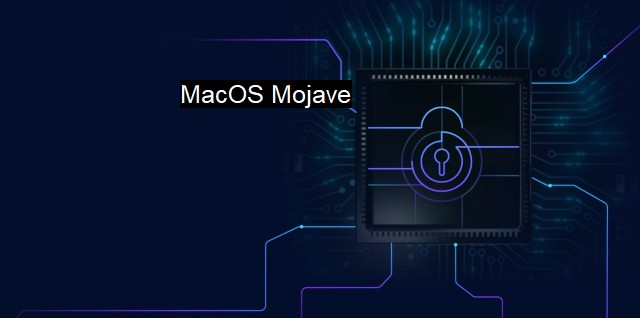What is MacOS Mojave?
Maximizing your Digital Security with macOS Mojave: A Comprehensive Review of its Advanced Cybersecurity Features and Antivirus Capability
MacOS Mojave, or more commonly known simply as Mojave, is the fifteenth significant release and is the operative system from Apple for Macintosh computers. Mojave was originally released to the public in September of 2018, offering a significant number of new features, improvements, and advancements not only to the overall user interface but also to aspects integral to the nature of cybersecurity and antivirus resistance.In terms of the visual and aesthetic changes, MacOS Mojave introduced a new system-wide dark mode and dynamic desktop features. the implications of Mojave’s arrival go beyond these cosmetic ones and are linked to critical developments in cybersecurity.
In the cybersecurity realm, Apple aimed to make MacOS Mojave more resilient to the pervasive threats in today’s digital environments. With MacOS Mojave, Apple introduced new data protections that require apps to get user permission before using the camera or microphone, or before accessing personal data like mail history and message database.
One of the critical changes that took place with Mojave was the introduction of a new concept of 'Notarized Apps'. Apple’s strategy was to ensure that all apps not distributed via the App store should be examined (notarized) by the company for malicious components. This notarization service allows Apple to keep a certain level of control over developers and better filter any harmful software that may compromise their clients' security.
Beyond the innovative improvements, Mojave continued its commitment to sandboxing, gatekeeper, and several other existing safety features. 'Sandboxing' is a technique synonymous with macOS and iOS platforms that creates various forms of limitations on applications’ reach on the operating system. It contains the applications within their environment to limit the kind of access they have across the OS. If, for instance, an app turns out to be corruptive or harmful, the effects will be limited to that sandboxed environment only, thereby protecting the larger system.
Mojave also introduced many enhancements to its browser, Safari, to increase its market share by augmenting privacy for its users. These changes help counteract 'fingerprinting', a technique used by data companies to track users by collecting information about their devices.
Despite these efforts in improving data protection and privacy, we should note that no system is impervious to security breaches. Therefore, adding another layer of protection via antivirus software is a recommended action. These third-party tools are essential to scan systems continually, remove any detected viruses, and block any potential threats. In doing so, they complement with the inherent protections of MacOS and address any vulnerabilities which may be inevitably present due to the increasingly sophisticated virus and malware attacks.
The importance of updating macOS when a new version is released should not be underestimated, including for Mac users who argue that their device cannot be infected. Every update often brings enhancements and patches to ensure that the new threats recognised by cybersecurity professionals around the world are addressed. When MacOS Mojave initially was released, it provided tools which strengthen the cybersecurity posture of the Macs and should thereby be considered an essential update for all Mac users that were still on an older version of MacOS.
MacOS Mojave was an instrumental step in making MacOS much more secure and resilient to attacks. From introducing a new 'notarized apps' concept to enhancing user privacy in Safari, to persistent two-factor authentication, Mojave has undoubtedly raised the bar for cybersecurity standards in operating systems. the maxim 'prevention is better than cure' remains entirely applicable, and maintaining Antoine protection alongside these advances is a crucial step in ensuring the cybersecurity of your device.

MacOS Mojave FAQs
Is macOS Mojave secure?
Yes, macOS Mojave has several built-in security features that protect it from cyber attacks. It includes advanced permissions for accessing sensitive files, improved Safari browser security, and enhanced data protection.Does macOS Mojave require antivirus software?
While macOS is generally considered safe from viruses, it is still recommended to have antivirus software installed. This is especially important if you frequently download and install third-party software or visit potentially dangerous websites.Which antivirus software is compatible with macOS Mojave?
There are several trusted antivirus solutions that work well with macOS Mojave, such as Norton Security, Avast Security, and Bitdefender Antivirus for Mac. It's important to choose a reputable antivirus program to ensure maximum protection against cyber threats.Can malware infect macOS Mojave?
Yes, macOS Mojave is not immune to malware infections. While macOS has built-in security features, cybercriminals are constantly finding new ways to exploit vulnerabilities. It's important to keep your system and antivirus software up to date to stay protected against the latest threats.| | A | | | B | | | C | | | D | | | E | | | F | | | G | | | H | | | I | | | J | | | K | | | L | | | M | |
| | N | | | O | | | P | | | Q | | | R | | | S | | | T | | | U | | | V | | | W | | | X | | | Y | | | Z | |
| | 1 | | | 2 | | | 3 | | | 4 | | | 7 | | | 8 | | |||||||